An example of an equity argument (to plagiarise)
We learn from each other by doing, and do more by learning from each other!
I am busy preparing for my video hearing with the Traffic Penalty Tribunal on 31st January, which is to defend one of our most previous liberties, the freedom to travel without let or hindrance. I got the expected stonewalling response to my latest questions on their lawfulness and legitimacy: “The matters of law and procedure that you raise should be made directly to the appeal adjudicator at the hearing of your appeal.” I am wondering if I have a case against the tribunal itself for being constituted to break superior constitutional law and erase civil rights.
These legal fights are forcing me to learn “combat law”. That is to say, not to become a lawyer out of professional interest or career ambition, but instead to oppose communist forces that have infiltrated our country and are endeavouring to trample our every cherished freedom, including the right to life. Equity is the key to overturning these infractions of our freedom by ever-expanding rules from the administrative state.
I have found the following two articles of considerable interest and educational value on the subject of equity:
I am sure you can refer me on to more. The volume of videos, articles, books coming my way is overwhelming. I eagerly anticipate the day when these corrupt governments are removed, and the courts are refounded on dignity, honesty, and equality. There is enormous wisdom in what the legal system has created over centuries of deliberation, and we must avoid rejecting it as a whole and embracing lawlessness.
Below are the notes that I have put together, and I will be using our friend CharGPT to condense them down to the core issue for actual final presentation. I hope you find them useful in your own battles with greedy and psychopathic officialdom. Interspersed in the text are images from the protest in Glasgow last weekend against their Low Emissions Zone (LEZ) and Low Traffic Neighbourhoods (LTNs). My own car is banned from the road in central Glasgow, despite posing no signifiant risk to the public. Remember, this is the same state that has killed and maimed the public with Covid bioweapons and lockdowns; they do care about our safety, but not in a positive sense.
I am Martin — an autonomous living breathing man with a soul (the same as the council rep and the adjudicator), attached to the dead legal fiction Mr Martin Geddes that appears on my driving license, DVLA registration, and this adjudication case.
Penalty Charge Notice (PCN) is based on the DVLA vehicle class N1
The tribunal is asked to adjudicate under The Road User Charging Schemes (Penalty Charges, Adjudication and Enforcement) (England) Regulations 2013 section 10 (2) which states “…the adjudicator must conduct the hearing of an appeal in the manner most suitable to the clarification of the issues and generally to the just handling of the proceedings”. This is ambiguous as to whether there is a duty to uphold the law (in all its forms), and the scope of that discretion.
Section 3 (2) b of the Newcastle and Gateshead Clean Air Zone Charging Order 2022 under the Transport Act 2000 specifies “Relevant vehicles” as “all vehicles of Class L, Class M2, Class M3, Class N1, Class N2 and Class N3.” DVLA classes the vehicle here as N1, which is “light goods”, having a body style “car derived van”. This puts my Ford Escort van on an equal footing with an HGV, but an unequal footing with a Ford Escort saloon, hatchback, or estate.
Class M1 vehicles (cars) are not charged, and Newcastle City Council (NCC) claims the authority to treat N1 vehicles differently. The N1 class only reflects the different body style (“car derived van”) in comparison to the M1 class (“car”), not the chassis or engine. In contrast, the L, M2, M3, N2, N3 classes all necessitate a difference in chassis and body type compared to an M1 uncharged vehicle. This PCN is legal in its narrowest administrative concern of following the rules, but is it lawful, given how M1 and N1 conveyances in private use are being treated differently?
Which jurisprudence applies in this case?
Is this a legal case (“common law”) or an equity case? As a purely legislative matter, the controversy to rule on is whether the class N1 light goods vehicle category obtained by DVLA for vehicle taxation can be converted into a clean air zone compliance category, and whether this is compatible with the Data Protection Act 2018, or results in infringement of legal rights to equal treatment and freedom of travel protected via the Human Rights Act 1998.
As an equity case — it is not about controversy, rather, it represents a serious infringement of protected individual rights and essential civil liberties. NCC lack “clean hands” (more later), and violate the Nolan Principles of public life. It is a clear case of mis-categorisation to the detriment of personal freedom, and thus is unalwful.
NCC’s case is founded on an untruth and an immoral act; this is tantamount to stealing, in Biblical terms. It takes what is not yours based on a falsehood, then does unto another something you would find objectionable if done to yourself. It doesn’t matter if Parliament (as legislature) or the council (as executive) told you to do it, it is still stealing.
So which approach to adjudication prevails? The Earl of Oxford [1615] case resolved this, and hundreds of years of English jurisprudence affirm that equity takes precedence over common law when they are in collision. The priceless right to travel in an ordinary conveyance of the day trumps the price of the clean air zone. Individual liberty comes before aggregate interest. The adjudicator should consider the whole matter, not merely the minuscule technocratic scope of the CAZ rules.
That’s the law! Just does it apply in this tribunal venue, and is it within the scope of the adjudicator’s delegated authority as above?
Essence of the equity case against the PCN
NCC lack clean hands — via classification of a private Ford Escort used solely for social, domestic, pleasure use as a commercial vehicle necessitates me breaking the law on insurance, which is a false accusation. This lacks honesty and integrity, contrary to Nolan Principles. Factually my car is not commercial in any way in how it is being used.
The PCN elevates form above substance, contrary to equity principles, as illustrated by the McVities case of a comparable borderline case in tax law. My “car derived van” is factually a car (Ford Escort) and its body type is only superficial appearance. The form of my conveyance is not something NCC has an equitable right to regulate.
The PCN falsely presumes that a potential affordance for the transport of goods necessitates its actual use for commercial reward. This unfairly penalises car travellers who have no use for rear seats, but simply value a larger load space for their private domestic use. It denies a liberty of aesthetic and practical choice without a rational basis, against equity principles.
The PCN unfairly penalises a traveller without a balancing public interest. There is no specific public health crisis triggered by the volume of car derived vans (N1 class) in use as everyday conveyances. This results in the destruction of individual liberty to travel freely for no perceptible aggregate gain.
This PCN constitutes enrichment, as others in factually equivalent circumstances are not charged. This PCN charges me for the privilege of exercising a choice over the body style of my car, while NCC pays no penalty for trashing my civil rights. This is grossly inequitable.
This PCN fails to achieve a fair balance of interests by categorising what is substantially a car (N1 class) that can be used for domestic travel the same as the largest and most polluting fleet HGV vehicle (N3) that cannot, even if they have different charges. No distinction is made for vehicles that can be used in either a private or commercial modality, unfairly penalising a minority. M1 cars can be used commercially, yet go uncharged. N3 goods vehicles can’t be used for daily shopping.
You can drive a “compliant” car through Newcastle a thousand times at no charge, but if I go once and don’t pay, I risk having my car taken off me by debt collectors. This is again grossly inequitable, given that my car may in practise have no greater emissions, and is a travesty of my freedom of locomotion. Which takes us to…
This PCN unfairly conflates certification (“compliance”) with actual emissions. My conveyance is not certified to Euro 6 level, but that is not evidence of it having emissions beyond that limit. Absence of evidence of compliance to the most recent standard is not evidence of dangerous pollution. My car meets ordinary MOT emissions standards. The burden of proof is on the claimant to demonstrate there is a legitimate public interest in restricting my freedom to travel. This is absent.
This PCN lacks fairness in how administrative data is obtained and processed. Notwithstanding the Data Protection Act strictures and GDPR principles, the transmutation of data for road tax into an environmental levy, without permission or transparency, is unfair. How did a “car derived van” become a “van” and not a “car” on the DVLA website? Who knows! I also have not given permission for my picture to be taken or data collected by a corporation.
This PCN transforms the sacred right of a living man to travel in a private automobile into a privilege that is withheld from select members of the public, while granted to others, by a corporation. That corporate entity is using duress by the state to force you into associating yourself with a legal fiction under a license, which is personage and coercion. This is against the equity principle of fairness.
The limits of the tribunal process for dealing with equity cases
The tribunal format allows no equitable remedy or legal counter-claim for violation of civil rights. The tribunal system is problematic to me, as the adjudicator is not under a judicial oath to uphold the law in its widest sense. The adjudicator may be under another oath to the legal profession, creating a conflict of interest. The Regulations introduce personal discretion to end-run the law (it could be a Marxist adjudicator!). The finding is later “converted” from legal to lawful via statute (via s16 of Regulations). This all pushes on boundaries of English constitutional law demanding due process, notably Bill of Rights 1689, as well as ECHR Art 6.
In my work on unrelated matters to do with Council Tax I have discovered that Halsbury’s Laws of England states administrative tribunals are unconstitutional, and LCJ Widgery condemns them as extortion. Such concerns over their lawfulness are not new to CAZs or restricted to myself. Administrative tribunals are a tempting means to bypass superior law. This is not to impugn the honour of those present today. Administrative tribunals are efficient in their execution, but potentially devastating to longstanding liberties — as is the case here. This may require judicial review to resolve.
The moral necessity for equity to prevail as the applicable jurisprudence
This inequitable (but legalised) discrimination has severe consequences for me as owner of a car derived van as my daily conveyance.
In this case, I experience discriminatory treatment in Newcastle for wishing to use 2-seater with handy load space for a normal social journey that would be uncharged if I used an estate car rather than a “van car”. It is a huge use of my time to defend my civil liberties and right to travel on an equitable basis.
I face an effective driving ban by Transport for London — 2 miles in car to deliver my brother to the airport = £112.50 without a PCN, but 5000 miles by NOx emitting plane = £350; there was no due process or jury of my peers before this a fine or forfeit; ditto I face a £112.50 LEZ charge to park at Stanmore near M1 and get tube to healthcare appointments — each way.
I am prospectively charged to attend a public protest in Glasgow; this is a levy on movement to exercise an essential right. It took 30 minutes of research, and still not clear in advance where I can travel. Glasgow LEZ was implemented without an air quality crisis, and outwith lawful process.
Clean air is not the only public interest objective, and not even the only health goal. There is a reasonable suspicion of an entrapment agenda that isn’t public health, but rather is expanding political power, installing state surveillance, or seeking commercial gain.
A single issue to consider: according to equity — is this PCN fair and reasonable in the circumstances?
“Law is nothing without equity, and equity is everything, even without the law.”
— John Bouvier, institutes of American Law, vol. 4, 1854. sec Pg 100 sec 3724 Para 5
There are secondary matters — signage and consent, data protection and integrity, technical definitions — but I am not interested in exploring these; they fail to address the central matter of principle, which is the limit of Parliamentary power to discriminate (and hence NCC’s power to do the same), as constrained via the rules of equity, constitutional law, and international law.
The legislature is not permitted to create privileged or persecuted classes of traveller absent some balancing interest, of which there is none here, as van appearance is not a health hazard. This case hits on foundational law, especially the Bill of Rights 1689, as it establishes a grossly unequal treatment that is unconstitutional.
Detailed argument as to why M1 and N1 classes must be treated equally
To charge a car derived van differently from an otherwise identical private car means either the body shape is being directly levied in a way unrelated to emissions (which is illegal, as there’s no Stylish Truck Zone legislation in the Transport Act 2000), or its use is deemed not private due to being commercial in nature as secondary characteristic of its shape.
If I am operating in commerce, then I must be without valid insurance, and breaking the law. Either my insurance company is colluding with me, or I am putting other road users at risk of loss by being uninsured. To infer I am operating in commerce is to imply that I am a lawbreaker and offender. If that is untrue, then it is dishonourable, and contrary to the principles of equity.
So, is this a car (i.e. automobile), and is it private? If “yes” to both, then it is exempt.
The McVities case answers the “van” or “car” issue. My conveyance is a car, a Ford Escort, as that is its substance. That “van” is only its “body type” and merely form and appearance. The body plays no part in its emissions, and NCC lacks authority to regulate the body of my car.
Is it private? The facts state so. I have travelled over 27,000 miles in it, solely as private carriage. It is only insured for social, domestic, and pleasure use. There is no suggestion from NCC that I see, and certainly no evidence, that I am carrying goods or using it in the course of business. The burden of proof is on them, as they are making the implied commercial claim!
The CAZ is a use-based fee, so should rationally reflect use, since many conveyances can be used privately or in commerce. In this instance, I was taking a friend to the train station to collect lost luggage. I believe NCC has no public interest justification to treat me differently to a traveller in a Ford Escort estate car. As such, there is little adjudicator discretion when framed in equity terms.
Final thoughts for the adjudicator
In the camera image is not only a vehicle, but also a living breathing man with a soul. If you were in my shoes, and feel you would be aggrieved by discrimination, and make the same case, then you must dismiss this PCN on the grounds of equity. Only the substance of my conveyance is relevant, which makes it a car, and it factually is in private use.
Truth is stronger than legislation in law; Parliament cannot legislate a lie into reality. Equity is everything.
Thank you for your time and energy (as living, breathing, men or women).







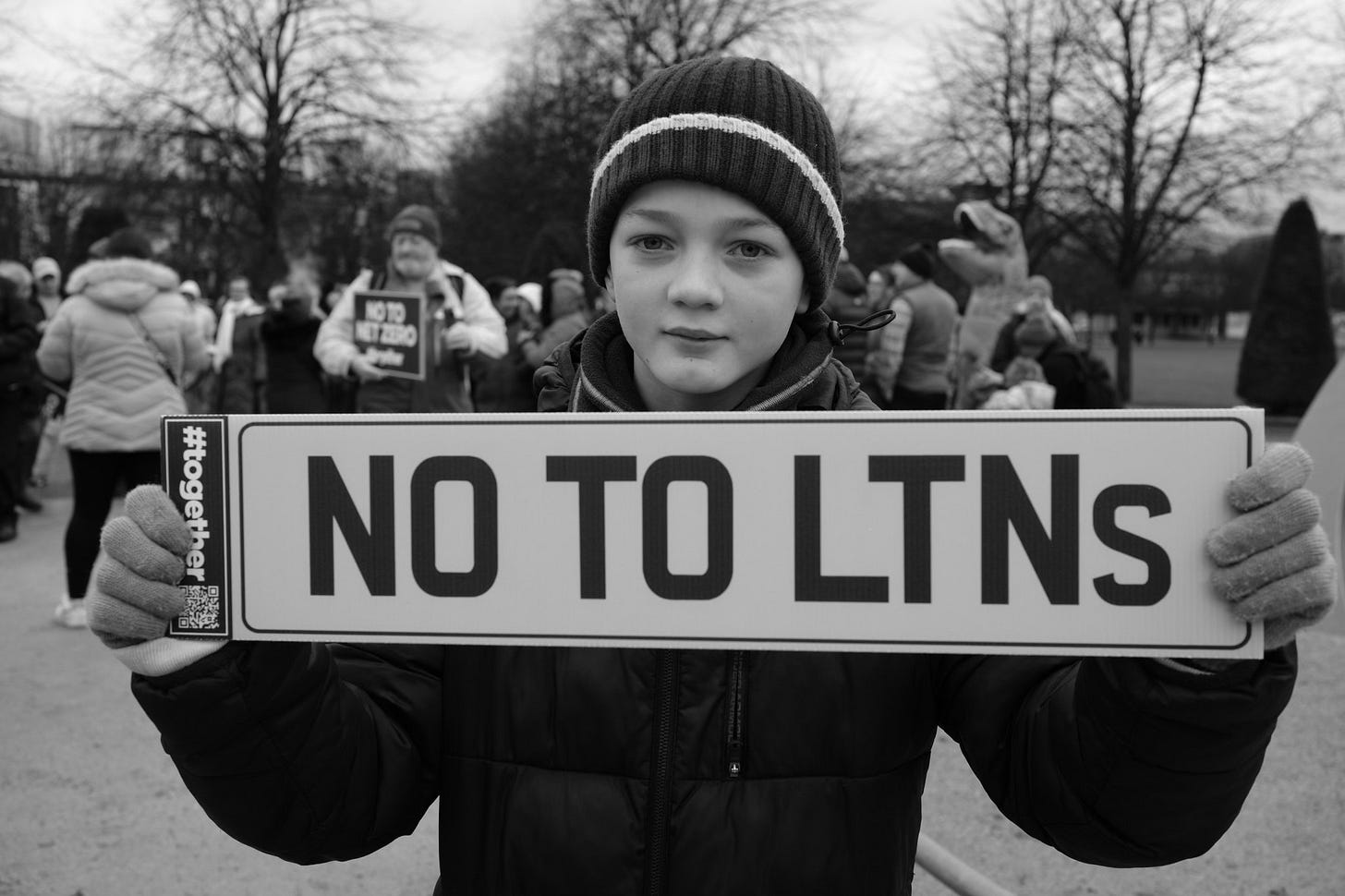

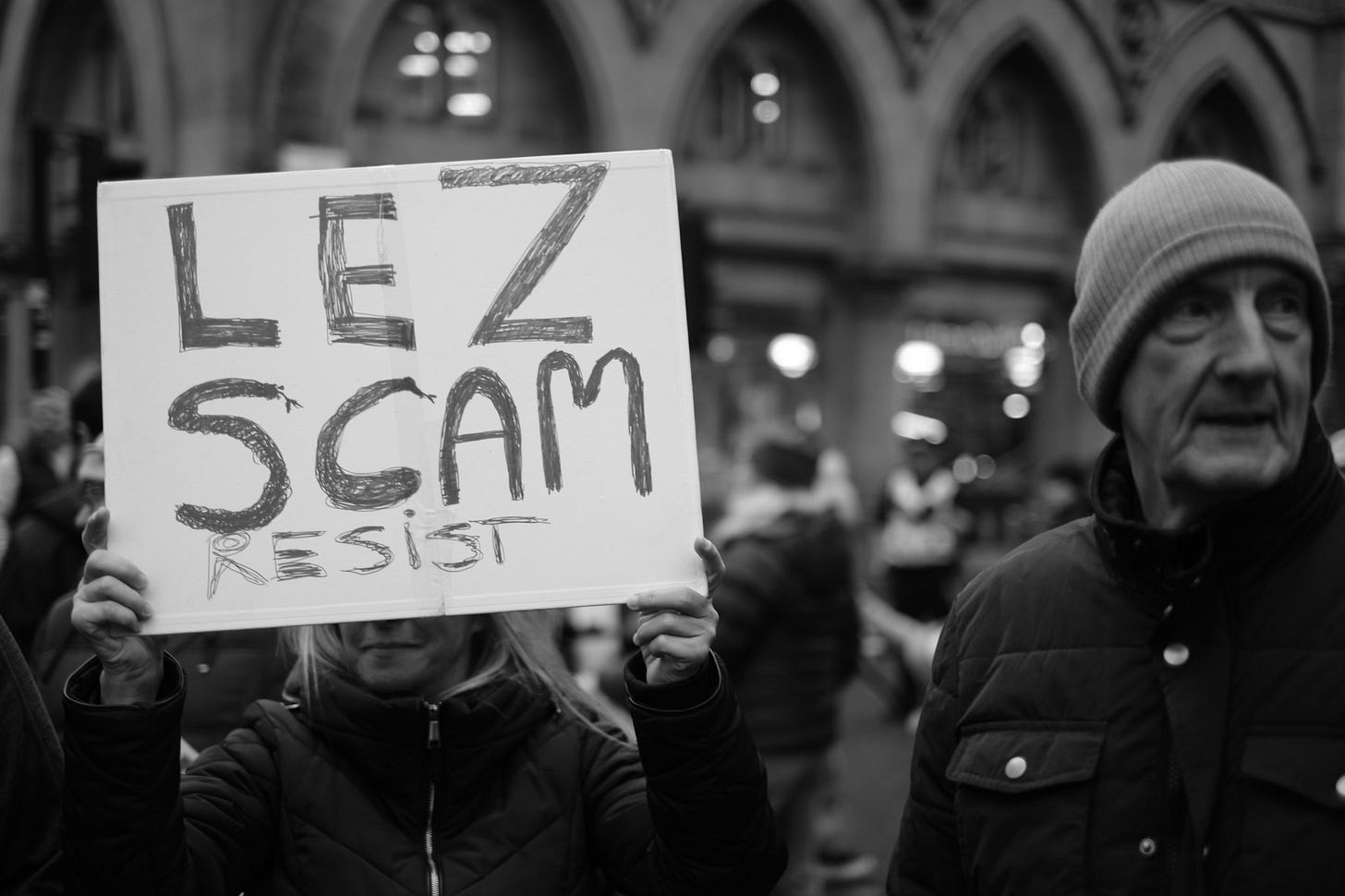




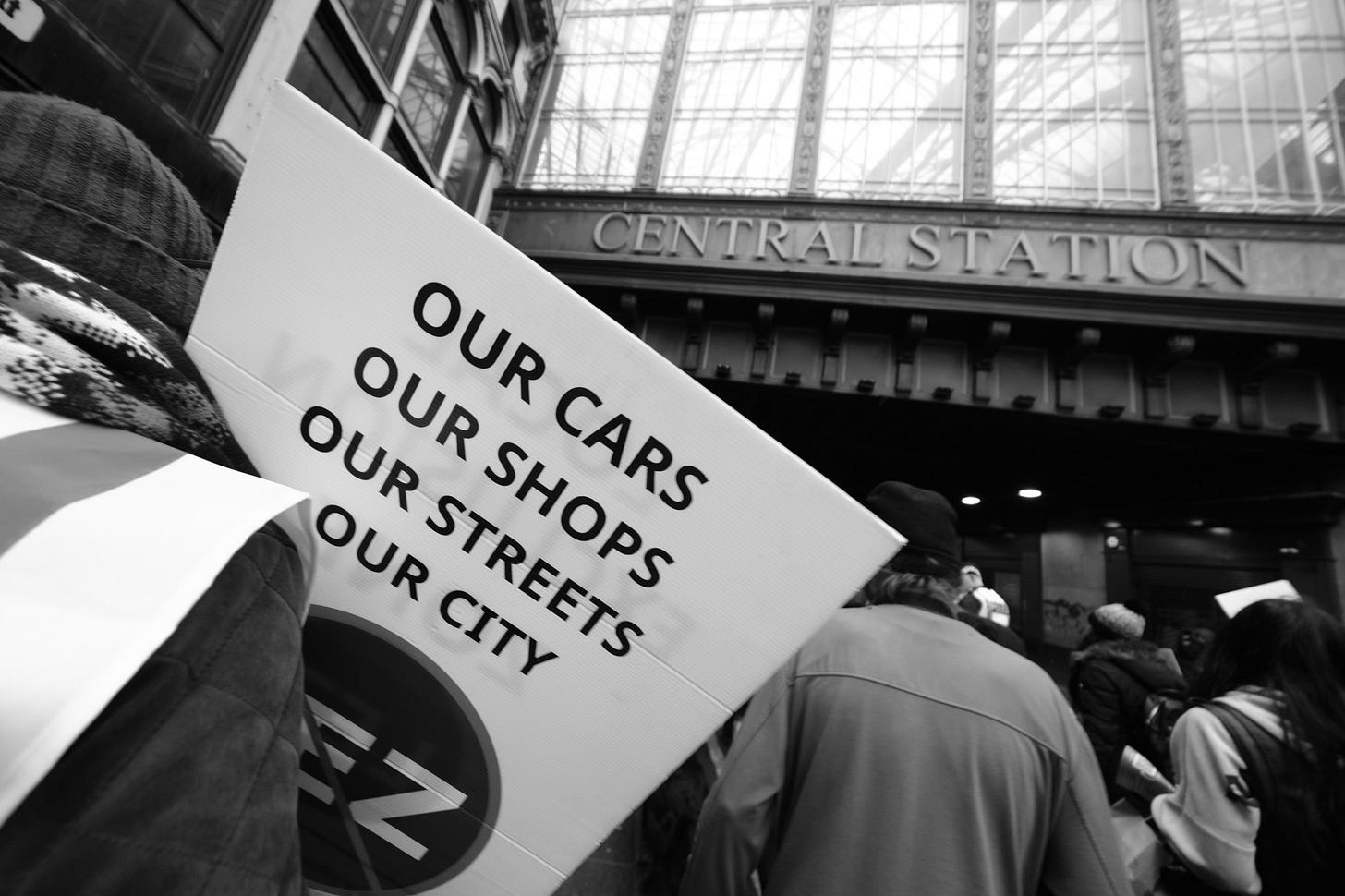
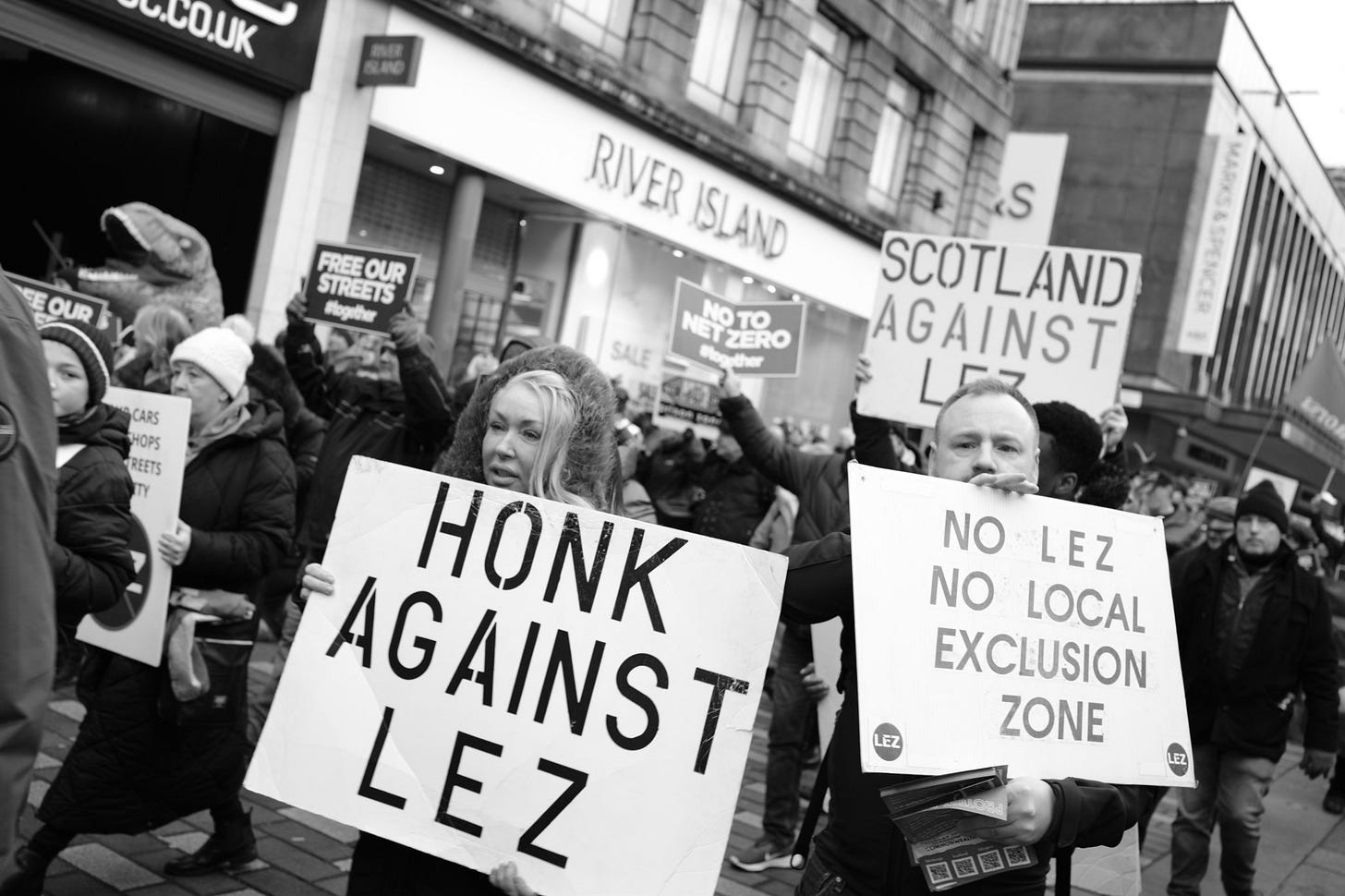
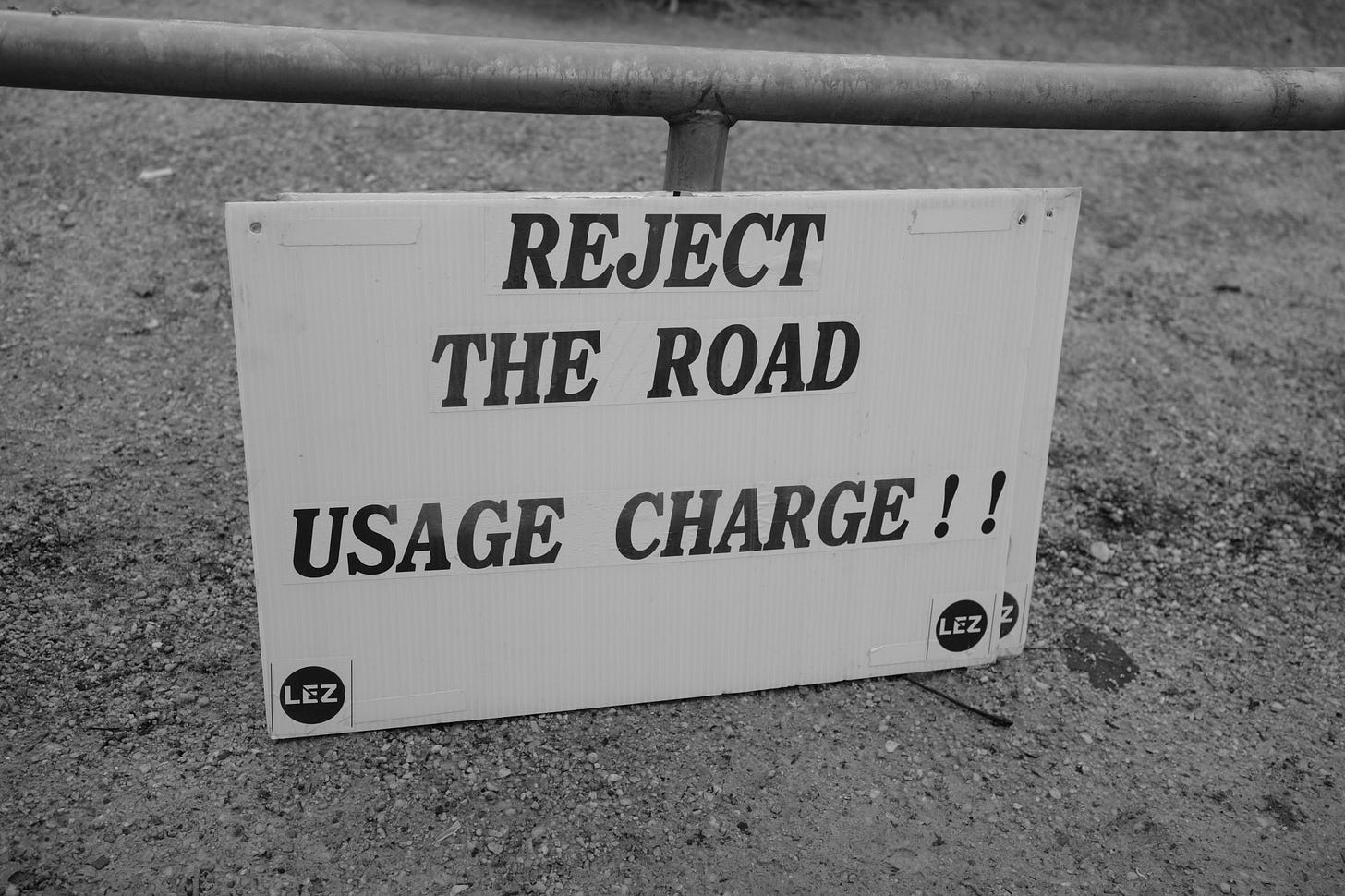


👍🤝
Are you informed of the rate of charge before entering a ulez zone so you can decide whether to enter or find an alternative route🤔
Is all the signage correct and clearly displayed🤔
A comment has been posted about wether the council print the summons for withholding CT payment or wether it is contracted out, possible data breach and may have other implications.
Every action taken by the government to restrict movement over the C19 event had no lawful basis and neither does ULEZ , definition of a scam: "a dishonest scheme"
Alison Wright (substack) has some great content and needs more coverage of the potential fraud she is looking in to with regards to our elected 🤣 officials💩👍
He who brings the case must prove the case. The adjudicator must be reminded that the burden of proof is upon whoever is bringing this case and they must substantiate that the pollution caused by your vehicle is different to that caused by the self same vehicle with a slightly different body configuration.
In order to do this one of the doctrines of equity must be enacted which is form over function . What is the actual intent of this law? What was in the mind of government when it passed this law? Surely they were looking to limit emissions and therefore the question must be posed as to how finding one engine that pollutes exactly the same as the other based upon the body shell surrounding it Must be nonsensical to the point of being absurd . If this were in a magistrates court then access to equity would be via section 148 of the magistrates court act which denotes that the court is a court of common law, subsequent to the Judicature act of 1873 and 1875 says that equity is to be used in all courts however is this adjudication even a court?
We were examining the de Crittenden ruling earlier this week and it would seem that the judge only dealt with the matter of “fines” and consequently may not have considered the matter of forfeiture which forms part of the case . May be some further reading is required to establish whether this is a reasonable argument that can be made...